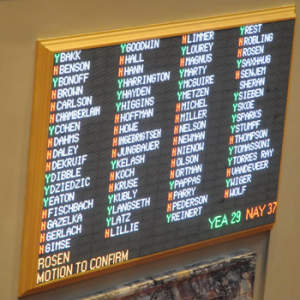 In a State Capitol environment rife with puerile debates, the most inane are those associated with confirmation of gubernatorial nominations to cabinet posts.
In a State Capitol environment rife with puerile debates, the most inane are those associated with confirmation of gubernatorial nominations to cabinet posts.
The State Senate pours too much blood, sweat, tears and time into confirmations. DFLers especially have used confirmations as a partisan bludgeon, rejecting Chris Georgacus in 1997, Steve Minn in 2000 (twice), Cheri Pierson Yecke in 2000, and Carol Molnau in 2008. Republicans haven’t blocked as many because they have held the Governor’s office for so long, but they did return the favor in 2012 by rejecting DFLer Ellen Anderson.
These tit-for-tat games are a waste of time and largely inconsequential. Usually, the nominees are just toyed with before being approved, but the toying itself expends too much legislative time and goodwill. Even in the relatively rare instance when a nominee is rejected – usually due to political score-settling rather than the nominee being unqualified or corrupt — the Governor simply puts forward a new nominee who has the same basic policy positions as the rejected nominee. The scene resembles a dog chasing its tail.
These confirmation debates represent the worst kind of scab picking in an institution that needs to heal key relationships in order to make more consequential policymaking possible. Picked scabs leave lasting pain and scars that impact the long-term ability of our state government to reach constructive compromises.
In an era when the executive branch and legislative branch vigorously compete against each other like the Minnesota Vikings and the Green Bay Packers, the legislative confirmation authority is the functional equivalent of the Packers possessing veto authority over which players the Vikings may have on their team. A Governor from any party should be able to choose his own team, and immediately put them on the field without waiting for the approval from the other team.
So I have a simple reform proposal: Stop it. Stop requiring legislative approval of the Governor’s cabinet members. Just stop it.
I know the confirmation requirement is traditional and legally mandated, but laws and traditions can be changed. Minnesota’s future success is not dependent on the continuation of the confirmation process, but it is dependent on legislators not clawing each others eyes out over issues that simply don’t matter that much.
I did take a civics class a long time ago, so I realize there is a downside of this. An imprudent Governor could choose a nominee who is grossly incompetent, inexperienced, and/or unethical. That can happen.
But when it does happen, legislators have the ability to expose the Governor’s flawed nominee in the news media and campaigns, and let voters decide whether the nomination bothers them enough to take it out on the Governor and his party at the ballot box. Yes, legislative confirmations are a check on gubernatorial power. But two checks on gubernatorial nominations already exist – freedom of speech and elections. The third check – Senate confirmation votes — just isn’t needed.
Whatever small benefits confirmations may have are dwarfed by the substantial wear and tear they put on policymaker relationships. Ending gubernatorial nomination confirmations certainly won’t stop bloodshed at the Capitol. But it will stop one of the more trifling reasons for bloodshed.
– Loveland
Note: This post was also featured by MinnPost Blog Cabin and Politics in Minnesota’s “Best of the Blogs.”
